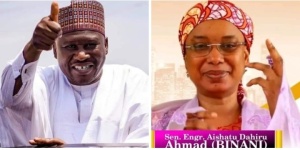The Presidential Election Petition Court (PEPC) admitted additional exhibits from the Labour Party’s (LP) presidential candidate, Mr. Peter Obi, in six more states to support his claims of rigging and electoral malpractices that led to his defeat in the February 25 presidential election.
Meanwhile, the petition filed by the Allied Peoples’ Movement (APM) challenging President Bola Ahmed Tinubu’s victory has been adjourned again, allowing the parties to reference a Supreme Court judgment on double nomination.
In the midst of these developments, the Independent National Electoral Commission (INEC) shed light on its objection to the tendering of its own documents as exhibits by Obi to support his petition against Tinubu’s election.
During the court proceedings, Obi and the LP submitted exhibits from six additional states: Adamawa, Bayelsa, Oyo, Edo, Lagos, and Akwa Ibom. These exhibits included Form EC8A, which were certified by INEC as true copies of the original documents and were admitted as exhibits.
However, at the end of the day’s proceedings, Obi’s counsel requested that the admitted documents be considered as read, but all respondents opposed the request.
Further hearing in the petition has been rescheduled for Monday, June 5, as decided by the Presiding Justice of the Court, Justice Haruna Simon Tsammani.
Regarding the APM petition, the petitioner’s counsel requested an adjournment until Friday, June 9, to allow the parties to access and review a Supreme Court judgment delivered on a similar matter.
The senior advocates representing the respondents in the petition did not oppose the application for adjournment.
Meanwhile, INEC explained its objection to the admission of several documents brought by Obi and the LP, stating that the documents were not challenged in the areas where the election was disputed.
INEC’s lawyer clarified that the result sheets and other documents sought to be tendered were from local councils where the conduct of the election was not disputed in the petition.
INEC accused Obi of attempting to confuse the issues by introducing result sheets from areas where the election and the returns were not challenged. The lawyer argued that Obi should have focused on the areas relevant to his petition.
Justice Tsammani expressed displeasure with INEC’s explanation, stating that it should have been provided at the address stage of the proceedings. The lawyer apologized for the timing but mentioned the media criticism faced by his client, which led to the explanation.
These developments have set the stage for further proceedings and considerations in the election petition cases.










